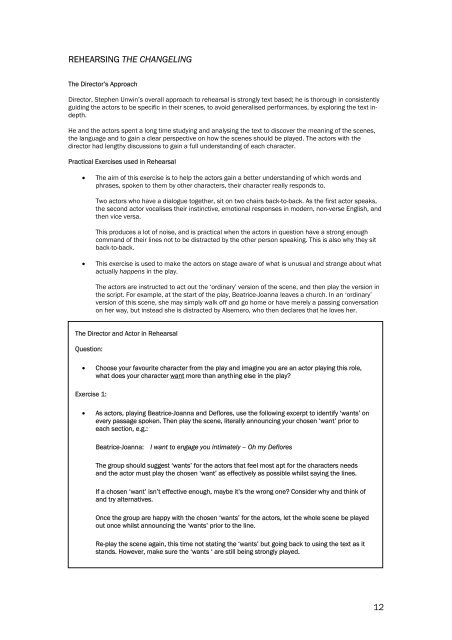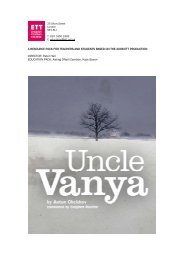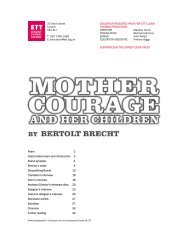Download The Changeling Education Pack - English Touring Theatre
Download The Changeling Education Pack - English Touring Theatre
Download The Changeling Education Pack - English Touring Theatre
Create successful ePaper yourself
Turn your PDF publications into a flip-book with our unique Google optimized e-Paper software.
REHEARSING THE CHANGELING<br />
<strong>The</strong> Director’s Approach<br />
Director, Stephen Unwin’s overall approach to rehearsal is strongly text based; he is thorough in consistently<br />
guiding the actors to be specific in their scenes, to avoid generalised performances, by exploring the text indepth.<br />
He and the actors spent a long time studying and analysing the text to discover the meaning of the scenes,<br />
the language and to gain a clear perspective on how the scenes should be played. <strong>The</strong> actors with the<br />
director had lengthy discussions to gain a full understanding of each character.<br />
Practical Exercises used in Rehearsal<br />
• <strong>The</strong> aim of this exercise is to help the actors gain a better understanding of which words and<br />
phrases, spoken to them by other characters, their character really responds to.<br />
Two actors who have a dialogue together, sit on two chairs back-to-back. As the first actor speaks,<br />
the second actor vocalises their instinctive, emotional responses in modern, non-verse <strong>English</strong>, and<br />
then vice versa.<br />
This produces a lot of noise, and is practical when the actors in question have a strong enough<br />
command of their lines not to be distracted by the other person speaking. This is also why they sit<br />
back-to-back.<br />
• This exercise is used to make the actors on stage aware of what is unusual and strange about what<br />
actually happens in the play.<br />
<strong>The</strong> actors are instructed to act out the ‘ordinary’ version of the scene, and then play the version in<br />
the script. For example, at the start of the play, Beatrice-Joanna leaves a church. In an ‘ordinary’<br />
version of this scene, she may simply walk off and go home or have merely a passing conversation<br />
on her way, but instead she is distracted by Alsemero, who then declares that he loves her.<br />
<strong>The</strong> Director and Actor in Rehearsal<br />
Question:<br />
• Choose your favourite character from the play and imagine you are an actor playing this role,<br />
what does your character want more than anything else in the play?<br />
Exercise 1:<br />
• As actors, playing Beatrice-Joanna and Deflores, use the following excerpt to identify ‘wants’ on<br />
every passage spoken. <strong>The</strong>n play the scene, literally announcing your chosen ‘want’ prior to<br />
each section, e.g.:<br />
Beatrice-Joanna: I want to engage you intimately – Oh my Deflores<br />
<strong>The</strong> group should suggest ‘wants’ for the actors that feel most apt for the characters needs<br />
and the actor must play the chosen ‘want’ as effectively as possible whilst saying the lines.<br />
If a chosen ‘want’ isn’t effective enough, maybe it’s the wrong one? Consider why and think of<br />
and try alternatives.<br />
Once the group are happy with the chosen ‘wants’ for the actors, let the whole scene be played<br />
out once whilst announcing the ‘wants’ prior to the line.<br />
Re-play the scene again, this time not stating the ‘wants’ but going back to using the text as it<br />
stands. However, make sure the ‘wants ‘ are still being strongly played.<br />
12





